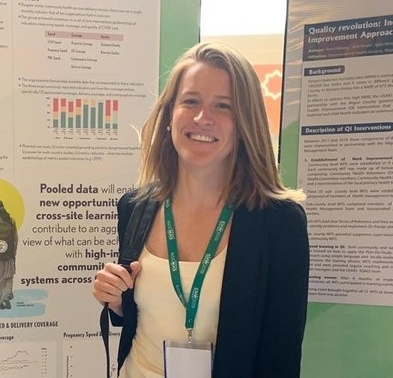Madeleine Ballard, PhD, is Co-Founder and Executive Director of the Community Health Impact Coalition, an alliance of community health implementers (including Last Mile Health) in 20+ countries working to accelerate the adoption of high-impact community health systems design. From HIV and AIDS to community health, Madeleine has spent her career working alongside advocates to bring about large-scale structural change. Notably, she was the founding Program Manager of Last Mile Health‘s community health pilot in Liberia’s remote Konobo District from 2011-2013. We sat down with her to discuss how the Community Health Impact Coalition is accompanying partners and governments to adopt best-practices in community health.
 What is the Community Health Impact Coalition?
What is the Community Health Impact Coalition?
The Community Health Impact Coalition was created by some of the field’s most innovative implementers to catalyze the adoption of high-impact community health systems worldwide. In recent years, many countries have begun to institutionalize or strengthen their community health worker programs. Yet, despite hundreds of studies on the impact of community health systems, there has been uneven progress in reducing infant mortality and morbidity. To be effective, investments in community health programs must be coupled with strong systems design and implementation.
We identify the best practices for quality care delivery and accompany partners to adopt those practices across the entire community health ecosystem, including funders, technical assistance agencies, NGOs, and—most importantly—Ministries of Health.
This collaboration allows us to do things we couldn’t do alone. Together, our voices are stronger, our message can go further, and we can do more for our patients.
What are the drivers of successful community health programs?
Accrediting community health workers. While nearly everyone agrees on the efficacy of community health workers, there are divisions around payment. We need to shift this mindset to one where community health workers are seen as a professional cadre who are compensated, continuously trained, supplied, and supervised. Community health worker programs that institute these practices report increased motivation and job satisfaction and, ultimately, better service delivery for communities.
How does advocacy inform change?
To create an enabling environment for quality, we need to move from ad hoc to systematic adoption and institutionalization of the best practices that enhance quality of care. For example, rather than using a quality checklist like the Community Health Worker Assessment and Improvement Matrix just once, it instead must become part of each organization’s standard operating procedure.
How can we scale health for all?
The ethos of the Community Health Impact Coalition is radical collaboration for better design. We’re trying to fill the implementation science and knowledge translation gap by open-sourcing best practices that fuel quality care delivery and working together to drive uptake. Too often in the development sector organizations tend to focus on their own growth, push their own brands, and see each other as competitors rather than collaborators. It is a testament to all of the organizations in our coalition that they understand that public sector systems change is not a competition for a share of the market—instead, the only way to achieve health for all is to work together.
The interview was edited and condensed for clarity.
This profile was written as part of a feature in our 2019 Annual Report, which showcases individuals from across all levels of the health system and the globe who play a critical role in the movement for universal health coverage – community leaders, government officials, philanthropists, clinical practitioners, policy specialists and more.




